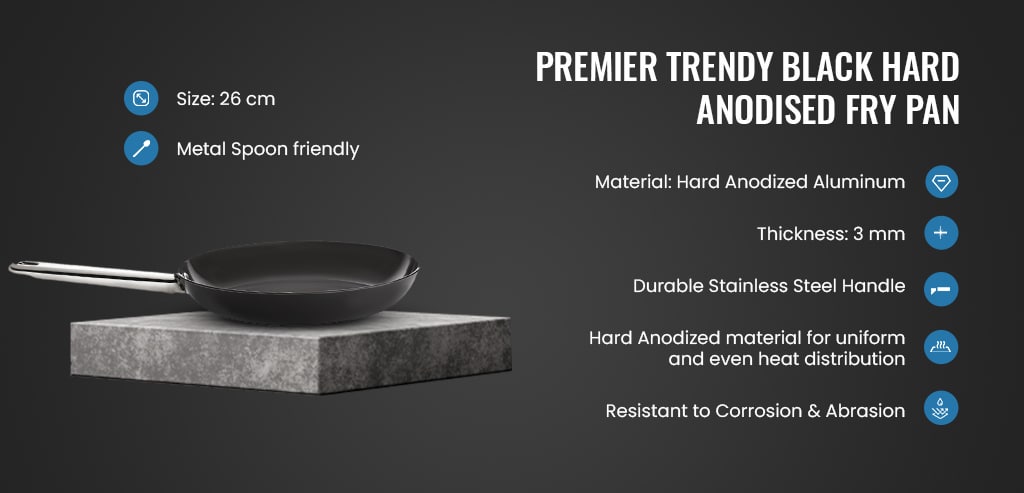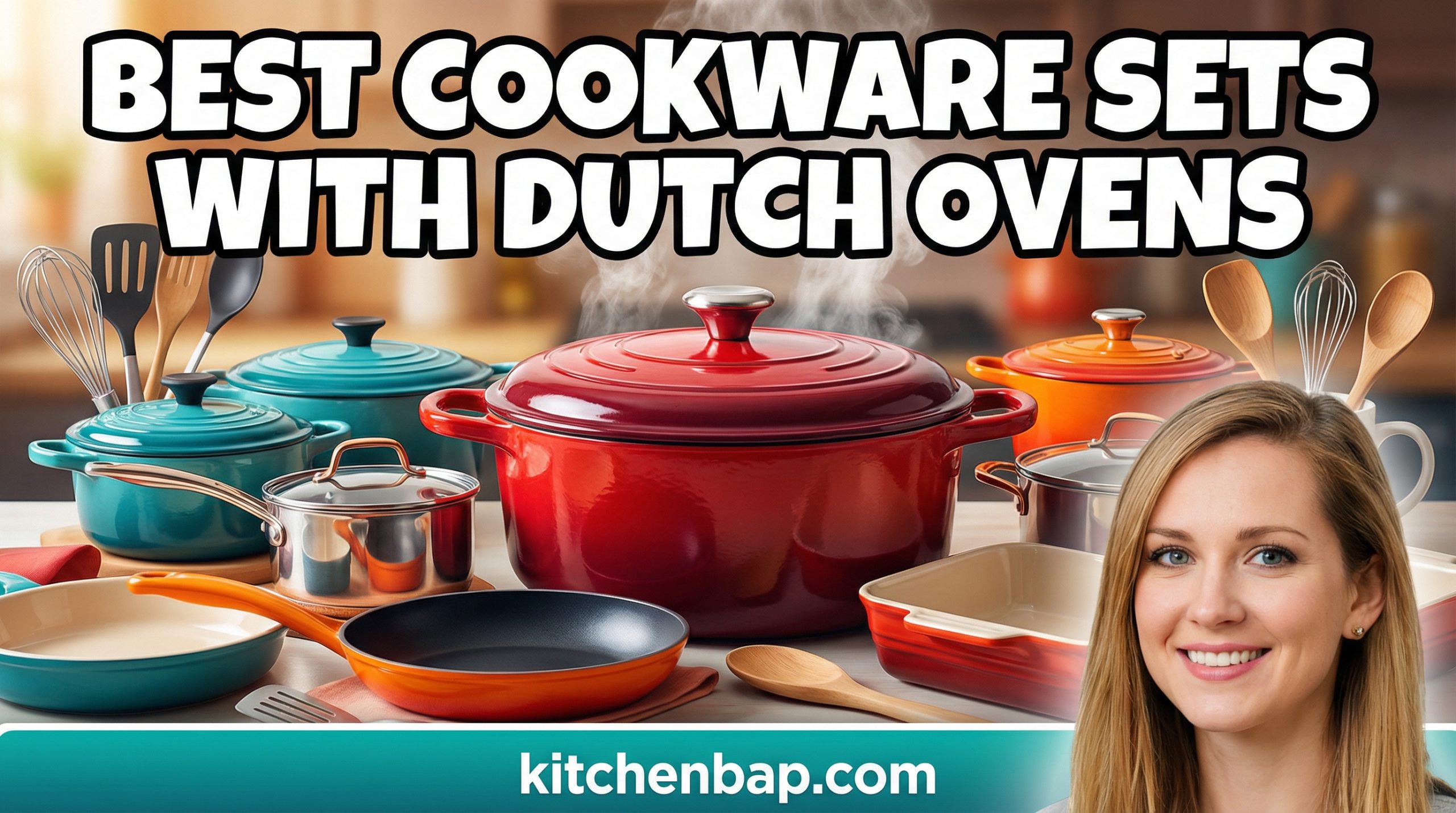Anodized cookware offers enhanced durability and a non-reactive surface. It provides efficient heat distribution for better cooking results.
Anodised Cookware Benefits:Anodized cookware is a popular choice among home cooks and professional chefs alike, and for good reason. This kitchen staple undergoes an electrochemical process that hardens its aluminum exterior, creating a robust layer resistant to corrosion and wear. Not only does this make it a long-lasting addition to any kitchen, but it also ensures that it won’t leach into foods, keeping flavors true and potentially reducing health risks associated with other types of non-stick surfaces.
The process of anodization also gives cookware a non-stick quality without the need for chemical coatings, making cleanup a breeze. With its ability to conduct heat swiftly and evenly, this type of cookware helps to prevent hotspots, ensuring meals are cooked thoroughly and efficiently. Whether you’re sautéing vegetables or searing meat, anodized cookware is a versatile and practical choice for creating delicious, well-prepared dishes.
:max_bytes(150000):strip_icc()/faw-detail-kitchenaid-hard-anodized-induction-10-piece-nonstick-cookware-set-14-wdickey-272-ab10854e2a2e4c37b365f13cc9a1c70e.jpeg)
Credit: www.foodandwine.com
Introduction To Anodised Cookware
Imagine a kitchen where cookware lasts a lifetime. Anodised cookware makes this possible. These pots and pans resist scratches and corrosion. They also provide even heat for perfect cooking results. This guide explores the unique benefits of anodised cookware.
What Is Anodisation?
Anodisation is a process that strengthens cookware. It involves using electricity to add a protective layer to metal. This layer is hard and non-reactive. It makes cookware durable and easy to clean.
History And Evolution
Anodised cookware has a rich history. It began with industrial uses in the early 20th century. Cooks soon noticed its advantages. Over time, anodisation improved. Now, anodised cookware is a favorite in many kitchens.

Credit: www.youtube.com
Durability And Longevity
Anodised cookware is a robust addition to any kitchen. It stands out for its ability to last. Users enjoy its resilience over years of cooking. This cookware type resists scratches and corrosion. It maintains a like-new appearance longer than most. Let’s explore the aspects that contribute to its durability and longevity.
Resisting Wear And Tear
Anodised surfaces are hard. They withstand daily kitchen activities. Knives and utensils won’t easily damage them. The anodisation process creates a protective layer. This layer guards against common issues. It prevents chipping and peeling. Cooks can stir and flip without fear.
Comparative Lifespan
When compared to other cookware, anodised options excel. They outlast their non-anodised counterparts. A table below shows the lifespan comparison:
| Cookware Type | Estimated Lifespan |
|---|---|
| Anodised | Over 5 years |
| Non-Anodised Aluminium | 1-3 years |
| Coated Non-Stick | 1-5 years |
| Stainless Steel | 2-5 years |
| Cast Iron | Over 5 years |
Anodised cookware’s lifespan often surpasses the average. The upfront cost is offset by the years of service. Users save money in the long run. They avoid frequent replacements. This makes anodised cookware a wise choice for both home cooks and professionals.
Enhanced Cooking Performance
Anodized cookware transforms kitchen routines with superior cooking traits. It boosts heat management, ensuring meals cook perfectly. Explore how this advanced cookware enhances performance in every recipe.
Even Heat Distribution
Anodized cookware stands out with its ability to spread heat evenly. This prevents hot spots. Foods cook uniformly across the surface. Chefs trust this feature for consistent results.
- Aluminum core: Conducts heat fast and evenly.
- Durable surface: Resists warping, maintains even heating.
Reducing Cooking Time
Speed in the kitchen is crucial. Anodized cookware heats up quickly. This slashes cooking time. Save energy and enjoy meals faster.
| Cookware Type | Heat-up Time |
|---|---|
| Anodized | Quick |
| Traditional | Slower |
:max_bytes(150000):strip_icc()/stainless-steel-frying-pan-184868138-58346eb53df78c6f6a0e9cba.jpg)
Credit: www.thespruceeats.com
Health And Safety Benefits
Anodised cookware brings a wealth of health and safety advantages to your kitchen. Its unique properties ensure you cook with the utmost care for your well-being.
Non-toxic Surface
Anodising creates a non-toxic layer on cookware. Unlike traditional non-stick coatings, it doesn’t release harmful chemicals, even at high temperatures. This feature makes anodised pots and pans safer for every meal.
Reduced Need For Oils
The surface of anodised cookware is non-stick. It allows for cooking with minimal oil. This supports healthier eating habits by reducing fat intake.
- Resists scratching and corrosion
- Withstands high cooking temperatures
- Maintains food’s true flavors
Ease Of Maintenance
Ease of maintenance stands out as a significant advantage of anodised cookware. Home chefs value their time and effort. This type of cookware respects both. Its unique properties make cleaning less of a chore. Let’s dive into the specifics that make anodised cookware a joy to maintain.
Simplifying Clean-up
Anodised cookware simplifies kitchen clean-up. Its surface resists food sticking. After cooking, a simple soak and wipe often suffice. Unlike other pots and pans, these don’t demand intense scrubbing.
- Non-stick surface ensures easy food release.
- Soapy water and a sponge mostly do the trick.
- Dishwasher use is often safe, but hand wash is gentle.
Resistance To Staining
Stains can ruin the look of cookware. Anodised aluminium resists this issue. The anodisation process seals the surface. It prevents colors from seeping in. So, your pots and pans stay looking new.
| Feature | Benefit |
|---|---|
| Sealed Surface | Keeps cookware stain-free |
| Color Resilience | Maintains original appearance |
| Chemical Resistance | Defends against acidic foods |
Aesthetic Appeal
Aesthetic Appeal is key in modern kitchens. Anodised cookware brings beauty to cooking. It blends design with function. Home chefs love this stylish choice. Let’s explore why its looks matter.
Modern And Sleek Design
Anodised cookware boasts a contemporary feel. Its minimalistic style fits any kitchen decor. The smooth surface reflects a modern lifestyle. Cookware should not only be functional. It should also complement your space.
Color And Finish Durability
Anodised cookware’s finish lasts long. Its color does not fade or peel. This durability means cookware looks new for years. No more replacing pots due to worn-out appearances. Enjoy lasting kitchen beauty with anodised options.
Cost-effectiveness
The term ‘Cost-Effectiveness’ is vital when considering kitchen investments. Anodized cookware is a prime example of cost efficiency in the culinary world. Let’s delve into what makes this type of cookware a smart financial choice.
Initial Investment vs. Long-Term Savings
Initial Investment Vs. Long-term Savings
Many shy away from anodized cookware due to upfront costs. Yet, these pieces are durable and resistant to wear. This means fewer replacements over time. Consider the longevity of anodized cookware and the investment becomes clear.
- Less frequent need for replacement
- Resists scratches and corrosion
- Keeps performance high for years
Comparing Prices With Other Cookware
Anodized cookware’s cost is competitive. It often outlasts cheaper options. Below is a comparison table that shows the price and lifespan of different cookware types.
| Type of Cookware | Average Cost | Estimated Lifespan |
|---|---|---|
| Anodized | $$ | 10+ years |
| Non-stick | $ | 1-5 years |
| Stainless Steel | $$ | 5-10 years |
| Cast Iron | $$ | Lifetime |
Choose anodized cookware for its balance of cost and lasting value. This choice ensures years of reliable use. Your budget will thank you in the long run.
Environmental Impact
The environmental impact of cookware is crucial. Anodised cookware stands out here. It offers benefits that are kind to our planet. Let’s dive into the specifics of its manufacturing and end-of-life stages.
Eco-friendly Manufacturing Process
Anodised cookware production is eco-conscious. This process uses a water-based solution. It avoids harmful chemicals. The result is a non-toxic finish. This makes anodised cookware safer for both users and the environment.
- Less pollution: The anodising process emits fewer toxins.
- Low energy consumption: It requires less energy than other methods.
- Water recycling: Many manufacturers recycle water during anodising.
Recyclability And Sustainability
Anodised cookware supports a sustainable lifestyle. It is 100% recyclable. The material’s durability means it lasts longer. This reduces waste and the need for frequent replacements.
| Feature | Benefit |
|---|---|
| Longevity | Less frequent need for new cookware. |
| Recyclable Material | Can be repurposed after use. |
| Reduced Landfill Waste | Minimizes environmental footprint. |
When its life cycle ends, anodised cookware can be recycled. This process is straightforward. It does not degrade the metal’s quality. Thus, it enters a new life cycle, reducing waste.
Frequently Asked Questions
Is Anodized Cookware Safe For Health?
Yes, anodized cookware is safe for health. Its non-reactive surface doesn’t release harmful chemicals into food. This type of cookware withstands high heat and resists scratching, making it a durable and healthy choice for cooking. Always use according to manufacturer’s instructions for the best safety practices.
Is Anodized Cookware Good?
Yes, anodized cookware is good. It’s durable, non-reactive to acidic foods, and provides even heat distribution. The non-stick surface also makes for easy cleaning. Ideal for various cooking tasks, it’s a popular choice among home cooks and professional chefs alike.
Which Is Better, Anodized Or Nonstick?
Anodized cookware is more durable and resistant to scratches compared to nonstick, which offers easy food release and requires less oil. Your choice depends on your cooking needs and preferences.
What Is The Healthiest Cookware To Use?
The healthiest cookware options include stainless steel, cast iron, and glass. These materials don’t release harmful chemicals and withstand high heat well.
Conclusion
Exploring the world of anodised cookware reveals a path to healthier, more efficient cooking. Its durability and non-toxic features stand out, making it a wise choice for any kitchen. Embracing these pots and pans means investing in quality that lasts, ensuring meals are not just tasty but safe.
Choose anodised cookware for a superior cooking experience.





Leave a Reply